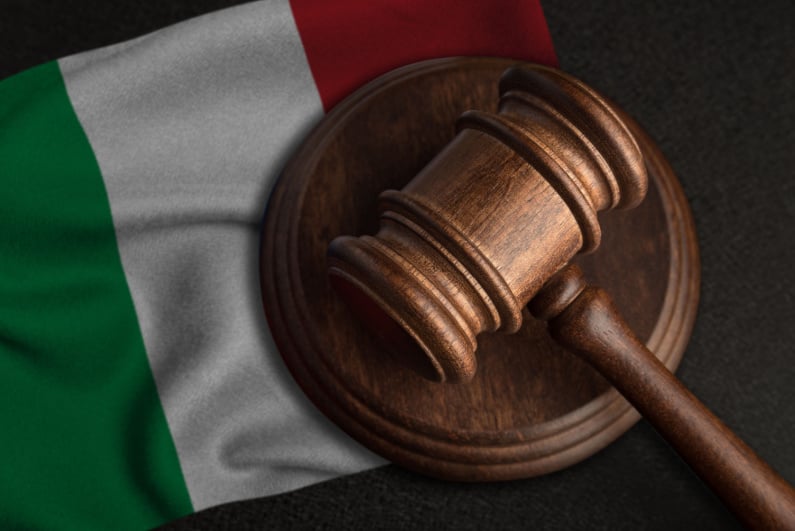Pave the way
Italy – Land of delicious food, beautiful landscapes, and… illegal gambling?
It can be said that Italy was the cradle of the European gambling industry. The ancient Romans used to play gambling to entertain themselves at night, a pastime that extended to the peoples they conquered. Italy was also home to the first official gambling house to appear in Europe – the Redotto in Venice, which opened in 1638.
He has fought against addiction and black market gambling for years
In light of this information, you might think that Italy would successfully learn how to keep the gambling market under control – but you would be wrong. The nation has struggled to combat addiction and black market gambling for years, a battle that became more difficult in 2006 when the government regulated online gambling as well.
Now, this is not an issue limited to Italy. Data indicate that levels of problem gambling in European countries range from 0.3% to 6.4% of the adult population. Italy falls somewhere in the middle of this. However, it is the growth of the country’s black market that sets it apart from the rest of the continent, causing real concern.
Why such a big fuss?
To assess the seriousness of Italy’s case, it is first important to understand the risks associated with black market gambling in any country.
The black market essentially constitutes any gambling company that operates outside the regulated framework of the state. This often includes offshore operators, who seek out customers from a particular country despite being located elsewhere, or unlicensed operators from within the same country who accept bets despite having no legal right to do so.
They do not have to check whether the customer has been self-excluded from other sites
The dangers of this are clear. These operators do not adhere to the usual rules and regulations regarding keeping customers safe. They don’t have to offer the safest gambling tools or carry out affordability checks. Perhaps most worrying is that they do not have to check whether a customer has been self-excluded from other sites or national registries before taking their money.
Black market gambling is a growing problem in Europe. Research from the Betting and Gaming Council It found that crackdowns on licensed operators have more than doubled the use of black market operators in just two years, from 220,000 users to 460,000 in 2022. The amount wagered is now estimated at billions of dollars annually.
Italian problem
Although the black market issue is clearly a European issue, Italy has seen some particularly worrying signs in recent years.
A recent report by the local newspaper La Gazzetta dello Sport Shedding some light on the current situation. It reported that the total turnover of illegal gambling in Italy now reaches 25 billion euros ($26.5 billion) annually. About 75% of this revenue comes from online gambling, about €18.5 billion ($19.6 billion) of the total.
Revenues from this online trading are supposed to amount to around €1 billion for illegal operators. like The European Gaming and Betting Association indicated (EGBA), this is equivalent to the total regulated online gaming revenues of eight other EU countries combined. These countries specifically include Malta (€70 million), Croatia (€170 million), Lithuania (€170 million) and others.
Last year to date, the Italian Customs and Monopolies Agency has blocked access to 9,828 illegal gambling portals. This represents an increase of 400 cases over 2022, of which 143 cases came in the past month alone.
And the reason?
Last week, EGBA made its opinion clear regarding the reason for the growth of the black market in Italy. “The country’s ban on gambling advertising clearly favors the black market and must be reviewed,” the Gambling Authority announced in a press release. The EGBA was referring to Italy’s sweeping ban on gambling advertising – including sports sponsorship – which was introduced in 2018 to combat problem gambling.
Niklas Lindahl warned that the ban would push people towards the black market
It is worth noting that the managing director of the Italian company LeoVegas, Niklas Lindahl, warned that the ban would push people towards the black market at that time. In an open letter to Deputy Prime Minister Luigi Di Maio, Lindahl also claimed that such a ban could be unconstitutional, depriving licensed companies of advertising rights. But his pleas fell on deaf ears.
Five years after the Italian government decided to go ahead with the ban, it certainly appears that Lindahl may have been right after all. Black market gambling now accounts for 23% of all bets placed in Italy, the third highest total in Europe. But before we make any assumptions about why, let’s take a look at the other three EU countries at the top of the list:
Norway
It has a government monopoly system for online gambling, which means gamblers only have one option, which is Norsk Tipping. Its black market is the largest in Europe. About 66% of all money in Norway goes to illegal operators.
France
Like Norway, there is also a monopolized gambling sector. State-owned companies Pari Mutuel Urbain and Française des Jeux operate the market. The black market in France accounts for 57% of shares.
Spain
In 2020, an almost complete ban on gambling advertising was imposed. The country now has the fourth largest black market in Europe accounting for 20% of all money invested, just behind Italy.
The opposite effect
The relationship between these countries with the lowest conversion rates is clearly visible. It is one of the most restrictive in terms of where its citizens can gamble or how licensed operators are able to advertise their services.
When confronted with problem gambling, the typical reaction of politicians uninformed about the issue is to punish the market itself. They will choose to impose restrictive legislation on licensed operators or even eliminate the market altogether, rather than listen to those who understand how damaging this course of action can be… *cough* Lyndall *cough*.
The same can be said about different industries where addiction is rampant and overeating can lead to serious consequences. Ban the sale of alcohol and people will take their chance on a homemade drink. Prohibit marijuana and users will buy it from dodgy street dealers. The vital difference between online gambling is that the illegal version is always accessible from any device, from the comfort of home.
97.6% of British customers gamble through licensed sites
If Italy wants to combat its growing problem, it might do well to look towards the United Kingdom – the European country with the highest rate of homing. UK Games Commission chief executive Andrew Rhodes recently bragged about this 97.6% of British customers gamble through licensed sites. Despite pressure from anti-gambling groups, the nation has done well not to clip the wings of its legal operators. They can still advertise with general freedom, despite some sports-focused restrictions.
While it may have the oldest gambling sector in Europe, Italy is years behind some of its neighbors when it comes to customer protection. To enter the modern era, it must focus more on ensuring that licensed operators do everything they can to protect customers rather than preventing them from actually getting any.



